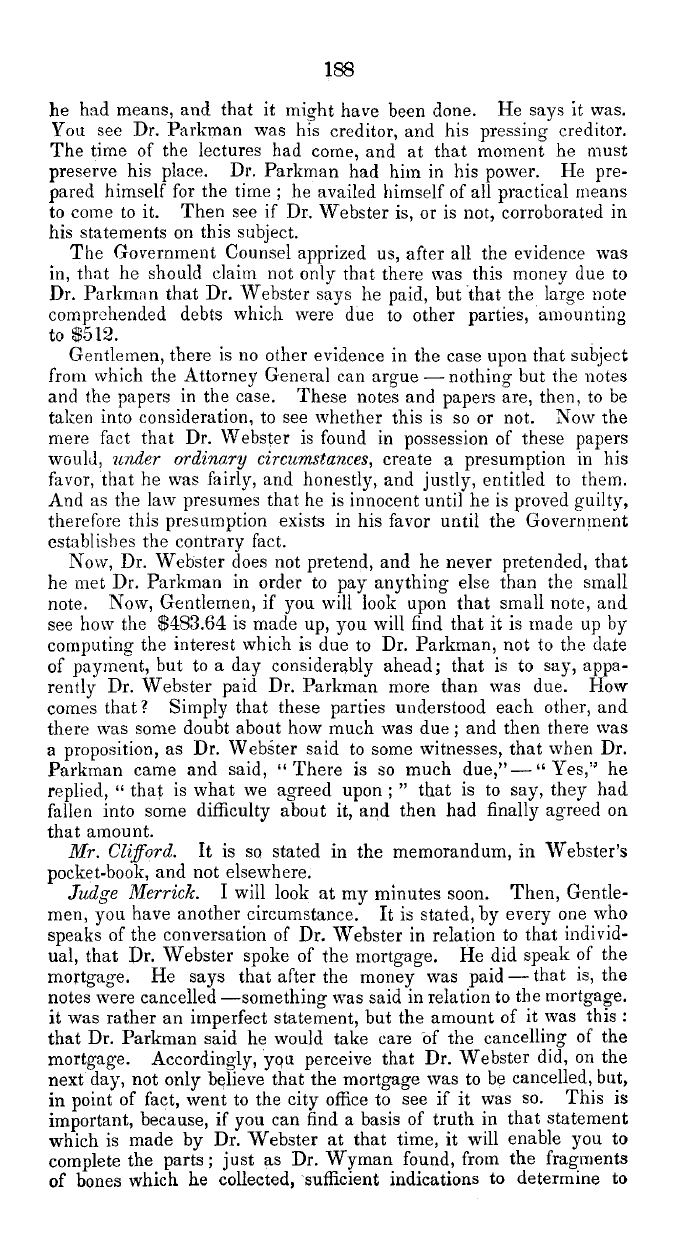|
188
he had means, and that it might have been done. He says it was.
You see Dr. Parkman was his creditor, and his pressing creditor.
The time of the lectures had come, and at that moment he must
preserve his place. Dr. Parkman had him in his power. He pre-
pared himself for the time ; he availed himself of all practical means
to come to it. Then see if Dr. Webster is, or is not, corroborated in
his statements on this subject.
The Government Counsel apprized us, after all the evidence was
in, that he should claim not only that there was this money due to
Dr. Parkman that Dr. Webster says he paid, but that the large note
comprehended debts which were due to other parties, amounting
to $512.
Gentlemen, there is no other evidence in the case upon that subject
from which the Attorney General can argue-nothing but the notes
and the papers in the case. These notes and papers are, then, to be
taken into consideration, to see whether this is so or not. Now the
mere fact that Dr. Webster is found in possession of these papers
would, under ordinary circumstances, create a presumption in his
favor, that he was fairly, and honestly, and justly, entitled to them.
And as the law presumes that he is innocent until he is proved guilty,
therefore this presumption exists in his favor until the Government
establishes the contrary fact.
Now, Dr. Webster does not pretend, and he never pretended, that
he met Dr. Parkman in order to pay anything else than the small
note. Now, Gentlemen, if you will look upon that small note, and
see how the $483.64 is made up, you will find that it is made up by
computing the interest which is due to Dr. Parkman, not to the date
of payment, but to a day considerably ahead; that is to say, appa-
rently Dr. Webster paid Dr. Parkman more than was due. How
comes that? Simply that these parties understood each other, and
there was some doubt about how much was due; and then there was
a proposition, as Dr. Webster said to some witnesses, that when Dr.
Parkman came and said, '° There is so much due,"-°° Yes," he
replied, " that is what we agreed upon ; " that is to say, they had
fallen into some difficulty about it, and then had finally agreed on
that amount.
Mr. Clifford. It is so stated in the memorandum, in Webster's
pocket-book, and not elsewhere.
Judge Merrick. I will look at my minutes soon. Then, Gentle-
men, you have another circumstance. It is stated, by every one who
speaks of the conversation of Dr. Webster in relation to that individ-
ual, that Dr. Webster spoke of the mortgage. He did speak of the
mortgage. He says that after the money was paid-that is, the
notes were cancelled-something was said in relation to the mortgage.
it was rather an imperfect statement, but the amount of it was this
that Dr. Parkman said he would take care of the cancelling of the
mortgage. Accordingly, you perceive that Dr. Webster did, on the
next day, not only believe that the mortgage was to be cancelled, but,
in point of fact, went to the city office to see if it was so. This is
important, because, if you can find a basis of truth in that statement
which is made by Dr. Webster at that time, it will enable you to
complete the parts; just as Dr. Wyman found, from the fragments
of bones which he collected, sufficient indications to determine to
|

